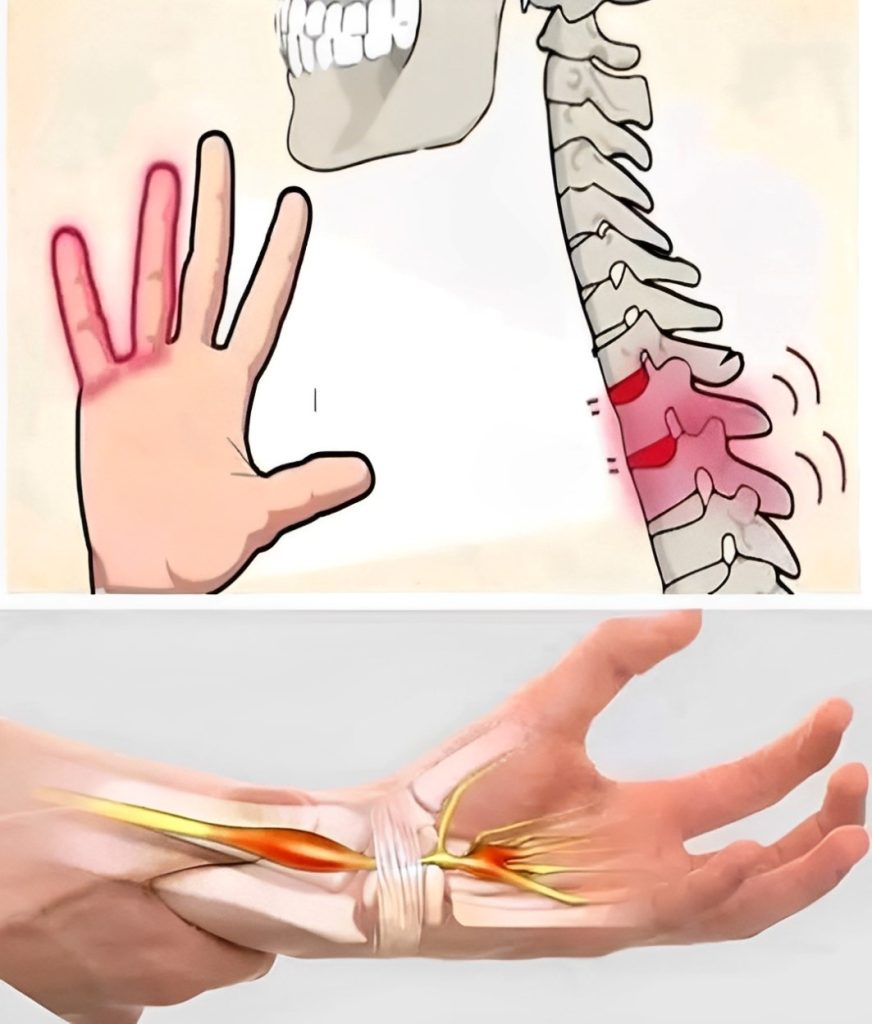
Tingling or numbness in your hands—often described as that “pins and needles” feeling—can either be just a fleeting annoyance or a sign of something more serious.
Sometimes it’s simply due to poor posture. Other times, it could point to an underlying health issue or imbalance. So, how do you know if it’s harmless or something that needs medical attention? Here are some of the most common causes to keep in mind.
1. Bad Sleeping Position: The Usual Suspect

We’ve all woken up with a numb hand after sleeping with an arm tucked under the pillow. That weird sensation—when your hand feels “dead”—happens because a nerve gets temporarily compressed, cutting off blood flow. Luckily, it usually fades in a few minutes after you shift your position.
Pro tip: Try using an ergonomic pillow and avoid tucking your arm under your head when you sleep.
2. Repetitive Motion: Watch Out for Carpal Tunnel
If you spend a lot of time typing, using tools, or doing any task that requires repeated hand movements, you might be at risk for carpal tunnel syndrome. This happens when the median nerve in your wrist gets compressed.
Signs to notice: tingling at night, hand pain, or reduced grip strength. If these sound familiar, it’s a good idea to talk to a doctor.
3. Vitamin B12 Deficiency: A Quiet but Important Issue

Vitamin B12 is crucial for healthy nerves. If you’re low on it—something that’s common among vegetarians or those with digestive issues like Crohn’s or gastritis—you might feel numbness or muscle weakness.
What to do: A simple blood test can check your B12 levels. If they’re low, supplementation is usually easy and effective.
4. Electrolyte Imbalance: When Minerals Go Off Track
Low or high levels of minerals like calcium, sodium, or potassium can mess with nerve signals and cause tingling. This might happen if you’re dehydrated or taking certain medications.
Smart move: Stay well-hydrated and see a doctor if the symptoms don’t go away.
5. Diabetes and Nerve Damage: A Common Complication
For people with diabetes, high blood sugar over time can damage peripheral nerves, leading to diabetic neuropathy. In fact, about half of all diabetics experience it.
Watch for: burning sensations, numbness, or a loss of feeling in hands or feet. It’s essential to get medical care early to help manage and slow down the condition.
6. Neck Issues: Signals Coming from Higher Up

Sometimes, problems in your neck—like a herniated disc or cervical spondylosis (age-related wear of the spine)—can press on nerves that run to your hands. This can cause tingling, often along with neck pain.
Advice: Don’t ignore these symptoms. Imaging tests like an X-ray or MRI can help pinpoint the problem.
7. Autoimmune Conditions: When the Body Attacks Itself
Diseases like rheumatoid arthritis or Guillain-Barré syndrome can affect your nervous system, causing numbness and weakness.
What to note: gradual numbness on both sides or unexpected muscle weakness should not be ignored.
8. Circulation Problems: Not Just Cold Hands

Conditions like Raynaud’s phenomenon can make your hands go cold, pale, or even bluish—often with a tingling feeling—due to temporary blood vessel constriction. More serious issues like atherosclerosis (narrowing of arteries) can also reduce blood flow.
Stay warm: Protect your hands from the cold, keep active, and check in with your doctor about your heart and blood vessel health.
9. Cysts or Tumors: Local Nerve Pressure
Sometimes, a benign ganglion cyst or other growth can press on a nerve in your hand, leading to tingling, pain, or reduced mobility.
Diagnosis: An ultrasound is often enough to confirm what’s going on.
10. Nerve Infections: Hidden Causes

Certain infections—like shingles or Lyme disease—can impact your nerves and trigger odd sensations in your hands.
Seek help if: you have a rash, fever, pain, or if you’ve recently been bitten by a tick. These could be signs of an underlying infection.
When Should You See a Doctor?
If the tingling in your hands:
-
- Lasts more than a few days
- Gets worse
- Comes with dizziness, slurred speech, or paralysis
Don’t wait—get medical help. A doctor can order blood work or neurological tests to find the cause and recommend the right treatment.
In Short:
Tingling in your hands isn’t always a big deal, but it shouldn’t be ignored either. It might just be from how you’re sitting or sleeping—or it could be a sign of something more serious. Pay attention to the signals your body sends. After all, your hands are powerful messengers of your health. Take care of them.




